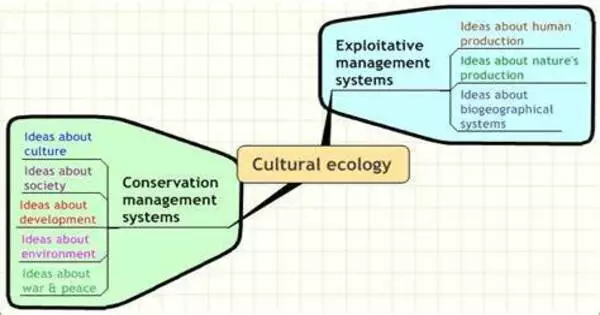Cultural ecology is a theoretical approach in anthropology and geography that investigates the interaction of human cultures and their environments. It is the study of how people adapt to their social and physical environments. Human adaptation encompasses both biological and cultural processes that allow a population to survive and reproduce in a given or changing environment. It arose in response to the realization that human societies are not only shaped by their natural surroundings but actively shape and adapt to them as well.
This field of study seeks to understand how the environment influences cultural practices, beliefs, and social structures, as well as how human activities impact the natural world. This can be done diachronically (looking at entities from different epochs) or synchronically (looking at a current system and its components).
Key concepts and principles of cultural ecology include:
- Adaptation: Cultural ecologists study how societies adapt to their surroundings through a variety of means, including technology, subsistence strategies, and social organization. Understanding how different cultural groups have developed distinct adaptations to the ecological challenges they face is part of this.
- Human-Environment Interaction: Cultural ecologists emphasize the dynamic interaction of humans with their surroundings. They investigate how cultural practices like agriculture, hunting, and settlement patterns affect ecosystems, as well as how environmental changes like climate change affect human societies.
- Cultural Landscapes: Cultural landscapes emphasize how humans alter and shape their surroundings, resulting in landscapes that reflect their cultural values and practices. Terracing in agriculture, urban development, and other forms of human intervention in the natural environment are examples of this.
- Ecological Determinism: Cultural ecology rejects strict environmental determinism, which suggests that the environment solely determines human behavior. Instead, it acknowledges the role of culture in shaping responses to environmental challenges. Cultural ecologists argue for a nuanced understanding that considers both environmental and cultural factors.
- Subsistence Strategies: Cultural ecologists study how different societies obtain food and resources from their environment. This includes examining hunting and gathering, agriculture, pastoralism, and other subsistence strategies, and how these strategies influence social structures and cultural practices.
The central argument is that the natural environment, particularly in small-scale or subsistence societies that rely on it in part, is a significant contributor to social organization and other human institutions. When combined with the study of political economy, or the study of economies as polities, it becomes political ecology, a new academic subfield. It also aids in the investigation of historical events such as the Easter Island Syndrome.
Cultural ecology has had an impact on the development of interdisciplinary approaches to understanding the complex relationships that exist between humans and their environments. It emphasizes the significance of taking cultural, social, and ecological factors into account in order to gain a comprehensive understanding of human-environment dynamics.
















